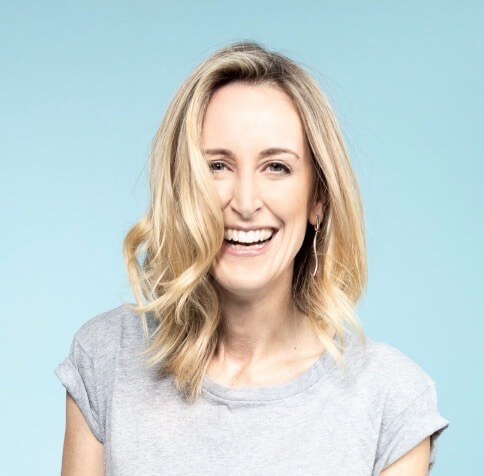“Our lives are profoundly different in many ways but we had so much in common that the distance between us felt small.”
Felicity Robinson and her family. © Supplied
When I signed up to the Connecting Worlds app, one of my greatest concerns was that I’d be matched with someone who loved cooking and wanted to share recipes. My repertoire of dishes extends from spaghetti Bolognese to… some other types of pasta, and so it was a relief when my match, Layla, confessed that she had reluctantly taught herself to cook.
“If I didn’t cook, no one would have anything to eat,” she said bluntly. “Sometimes I resort to YouTube for inspiration.”
Fortunately, neither of us are cooking for people with discerning palates. Layla has six children, aged from 13 to nine months, while I have four, aged between nine and three. We’re both very busy and have little time to ourselves — we get up early in the morning to work before the children wake, and during the app trial, we snatched time to text each other during breaks in housework. I loved that in the middle of the chaos of her family, Layla found time to talk about the small beauties in her life, from the flowers and herbs she grew on her balcony (far healthier than mine) to the smell of rain, which she loves, and the colours of the mountains near the Dead Sea.
As a journalist, I know the power of stories, and the way personal testimonies can be so profoundly moving. But I was unprepared for how much I was affected by the exchange of messages with my new Syrian friend during the month I trialled the app. Of course, our lives are profoundly different in many ways. She has experienced unimaginable trauma during the Syrian war, some of which she shared with me. But we had so much in common that the distance between us felt small. I looked forward to receiving her messages and she seemed to enjoy mine — and as an avid texter, I think I sent about 50.

Felicity Robinson, co-founder of PRIMER, a women’s site and social enterprise, is one of our Founding 50 women. © Supplied
We settled into a rhythm of writing every day or two, waiting for the other to respond before we wrote again. I liked the sound of her; she was kind and intelligent, and there was a poetic quality to the way she wrote. “I feel a pain in my heart,” she said, when one of her children was sick.
I thought hard about how to respond, as I wanted to support her as best I could, while not being in any way burdensome (like that person in your inbox you feel guilty about not having replied to). Life for her is undoubtedly hard; she used to live close to her parents and siblings, and now they’re scattered throughout the Middle East because of the war. She lost her first husband and her brother, and now the pandemic means her second husband is struggling to find work as a labourer on construction sites.
“Restrictions due to corona have weakened the labour market and we are still subject to complete home quarantine every Friday and Saturday,” she wrote. “People here are trying to manage as much as possible.”
To make matters worse, she is home-schooling her children. “This requires great effort from me,” she said. “What makes it more difficult is that when children are home, they’d rather play than study.”
When I read that, I laughed. Our home turned from sanctuary to zoo during remote learning.
There’s much to know about the complexities of the situation in Syria and Jordan, but connecting on an individual level — through interviews with field workers and experts, and my experience with Layla — helps you appreciate its emotional, personal consequences. For me, this is a real privilege and one of the most beautiful aspects of being a Founding 50 donor to the Leading Women Fund.
*We’ve changed Layla’s name for protection reasons
JOIN THE LEADING WOMEN FUND TODAY
Share on Facebook Share on Twitter